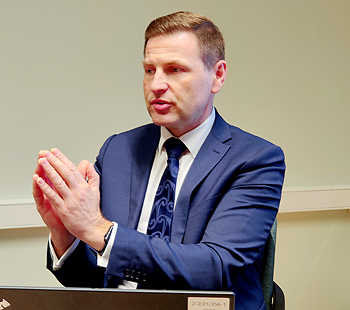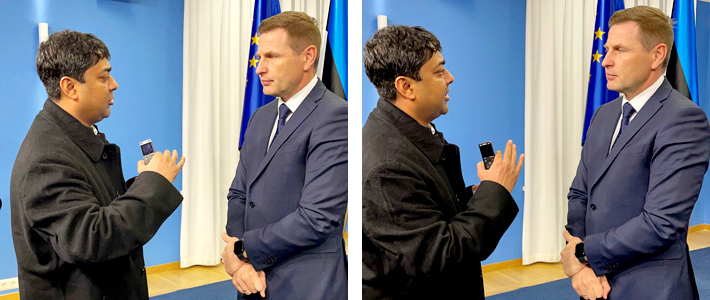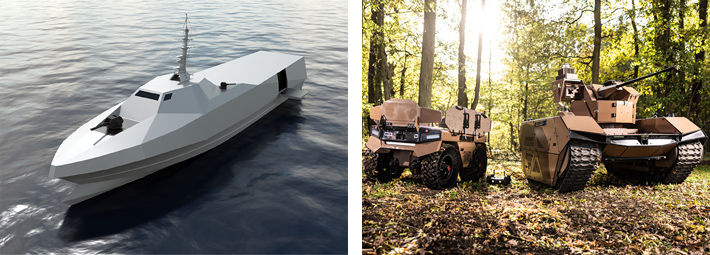INDIAN ARMED FORCES CHIEFS ON OUR RELENTLESS AND FOCUSED PUBLISHING EFFORTS

The insightful articles, inspiring narrations and analytical perspectives presented by the Editorial Team, establish an alluring connect with the reader. My compliments and best wishes to SP Guide Publications.

"Over the past 60 years, the growth of SP Guide Publications has mirrored the rising stature of Indian Navy. Its well-researched and informative magazines on Defence and Aerospace sector have served to shape an educated opinion of our military personnel, policy makers and the public alike. I wish SP's Publication team continued success, fair winds and following seas in all future endeavour!"

Since, its inception in 1964, SP Guide Publications has consistently demonstrated commitment to high-quality journalism in the aerospace and defence sectors, earning a well-deserved reputation as Asia's largest media house in this domain. I wish SP Guide Publications continued success in its pursuit of excellence.
- India's Operation Sindoor Sends a Clear Message to Terror and the World – ‘ZERO TOLERANCE’
- Japan and India set forth a defence cooperation consultancy framework, talks on tank and jet engines
- Terrorist Attack in Pahalgam in Kashmir: Unfolding a long surgical war against PAK
- Air Marshal Narmdeshwar Tiwari takes over as Vice Chief of the Air Staff, Indian Air Force
- Air Marshal Tejinder Singh takes over as AOC-in-C Training Command
Opportunity for Indian defence to collaborate in hi-tech manufacturing with Estonia: Defence Minister Hanno Pevkur
During the visit to Estonia, Manish Kumar Jha met Hanno Pevkur, Minister of Defence, Estonia in Tallinn. The defence minister talks about the ongoing breakthroughs in military tech especially, developing proven unmanned systems, sensors, communication and surveillance technologies, electronics, and equipment in Estonia.

Estonia is home to one of the world's most dynamic early-stage defence ecosystems. Estonia's focus on cyber and the AI ecosystem produced some of the best military systems today: Land robotics, naval & air-defence systems. Estonia is home to established companies like Milrem Robotics – whose unmanned ground robots and Baltic Workboats are leading the innovation of a semi-autonomous warship platform for European Union (EU) naval forces.
Defence Minister Pevkur talks about the opportunity for Indian entities to collaborate on such hi-tech AI-based military autonomous systems. Interestingly, it's important to note how Estonia, on a limited budget, leveraged high-grade autonomous military systems, its production and, effectively on the battlefield.
Estonia is home to one of the world's most dynamic early-stage defence ecosystems, with a focus on cyber and AI-driven military innovations, including land robotics, naval, and air-defence systems.
Estonia's International Centre for Defence and Security (ICDS) in 2024 reports that "cybersecurity is viewed as a pivotal element of future secure, safe, and trustworthy AI systems, allowing Estonian companies to leverage their competitive advantages and competence in larger projects led by their Allies Startups like Frankenburg Technologies, which plan to produce anti-drone missile systems and other next-gen military systems. Additionally, the initiative, called EUROGUARD, under the Baltic Workboats aims to develop a modular and semi-autonomous surface vessel platform with a remote-control system that could be used across Europe. The next-generation design, adaptable for various missions, would enable the application of this type of ship in different naval command and support roles.
"I was in India on a visit this year and I can say that our relationship is more exciting than before. And there are many things which are connecting us bilaterally."
Estonia contributes more than 2 per cent of its GDP to NATO as a part of the mandate. Uniquely, in the case of Estonia, despite the limited budget, the modernisation is planned in an effective military way with smart weapons and systems based on digital innovations which Estonia leads. How does Estonia plan to innovate and reinvigorate its industry? Defence Minister Pevkur elaborates on that. Also, in the discussion, several opportunities were outlined for greater Indo-Estonian defence manufacturing in India and Estonia as Ministers emphasized the two-way bilateral security cooperation.
Excerpts:
Manish K Jha: Defence Minister, you recently met India's External Affairs Minister S. Jaishankar. What did you discuss? What is the level of cooperation between India and Estonia?
Hanno Pevkur: Yes, I met with S. Jaishankar. We discussed, of course, international politics, and security situations. I was in India on a visit with political ministers this year and I can say that our relationship is more exciting than before. And there are many things which are connecting us bilaterally. It is a digital cooperation and cyber security and many other practical aspects. Because India is taking the lead more and more.
And, I like very much, Prime Minister Modi's programme about 'Make in India'. You know that in Estonia, companies are very innovative and we have the most unicorns in the world; in the capital, we have like 11 or 12 unicorns. These are the global Hi-Tech companies. We have the best environment for starting companies, but they need to scale up and India is a perfect country and partner for those investments, but also, as a huge market.

Then, we have 1.3 million people and India has 1.4 billion. So, this is something our people sometimes cannot understand, the scale of it.
The difference in the scale is very important for all of us and democracy. India is the largest democracy in the world. And that's why I use these opportunities with everybody to talk about now. As we talk about peace and peace processes. I've seen together more than 30 different initiatives and thoughts and more will be on the table in principle these are not going to be a peace process.
"We have the best environment for starting companies, but they need to scale up and India is a perfect country and partner for those investments"
So, this is a wonderful country, very safe for investments and we are leading in many subjects. We are 1.3 million people and these are crucial times for everyone. We must invest more in our defence capabilities.
Manish K Jha: The Estonian government has supported Ukraine's war effort, donating more than 1 per cent of its GDP to Kyiv. Tallinn announced various tranches of defence support. In light of this, does the government look at its economic burden and how does it plan to fund it? Will it be on debt?
Hanno Pevkur: We are establishing a new defence industry department. Of course, we all understand that in absolute volumes, Estonia is not so big. In fact, to get with our allies, we are strong and considering that we have to spend more on defence.
"There is an interest from Indian companies to invest in Estonia together with Estonia companies. So, it is important that they have found some important Estonian partners."
Then we have to introduce the defence tax, which will be enforced from the first of January. Every part of society will be taking part of this burden. So, it will be on the incomes of ordinary people. It will be on the profits of the entrepreneurs, and it will be also on consumption. So that means this is the aim of raising tax. Additionally, we have already invested the two per cent from regular incomes of the taxes. So, this is the only option for us as we see it. Of course, there will be also new mechanisms for instance in the European Union which has been discussed lately. but clearly, we see that we need to invest more in defence.
Manish K Jha: You have some of the most modern defence industries like MilRem Robotics, an established manufacturer of unmanned ground vehicles (UGVs). What could be done with India in such areas as unmanned systems? What are possible areas of collaboration with India in building military equipment together? Do you have such talks with India on this with the Indian military and what is your preposition on this to collaborate with India, whether you want to invest in India or you look at the Indian company to come and invest here?
Hanno Pevkur: I believe it's a two-way traffic. It's never one-way traffic. So, at the moment we are establishing a new defence industry park. Then we see that there is an interest from Indian companies to invest in Estonia together with Estonia companies. So, it is important that they have found some important Estonian partners.

And, I see that this cooperation is not only on the level of unmanned vehicles or robotics, it's also on the heavy industry. It's cooperation regarding the howitzers, regarding the ammunition production. So, there is also heavy industry involved in our cooperation and I truly believe that in upcoming years, we will see more and more of this kind of cooperation.
Manish K Jha: In your presentation, you talked about Baltic-US cooperation. Does it go beyond the EU, if there is a military tactical or expeditionary mission, Estonia would be involved? However, Estonia as a nation with the size, would you not stretch your capacity to engage worldwide?
Hanno Pevkur: We have done this for a very long time. We were in Afghanistan and we've been in Europe. We are at the moment in Iraq. I am visiting Iraq and will meet our troops next week. We have been together with our allies in the West, but also with the other allies in the different parts of the world.
"I see that this cooperation is not only on the level of unmanned vehicles or robotics, it's also on the heavy industry. It's cooperation regarding the howitzers, regarding the ammunition production."
This is very important because cooperation means that, you know, one for all and all for one, in good or in bad times. That means that the US troops are here in Estonia. We have a very good collaboration and very good cooperation with the United States. Also, on the Senate and Congress levels.
So, we have seen security budget is raised in the US budget. This has been increased yearly. This is very good cooperation.
So basically, when I put down the markers as our priority then firstly, boots on the ground in Baltic states, including Estonia. Secondly, our military cooperation in different parts of the world including Iraq and thirdly. Finally, cooperation -- defence cooperation on the parliamentary level where we see that they are investing more and more in Defence.
Manish Kumar Jha is a Consulting & Contributing Editor for SP's Aviation, SP's Land Forces and SP's Naval Forces and a security expert. He writes on national security, military technology, strategic affairs & policies.





